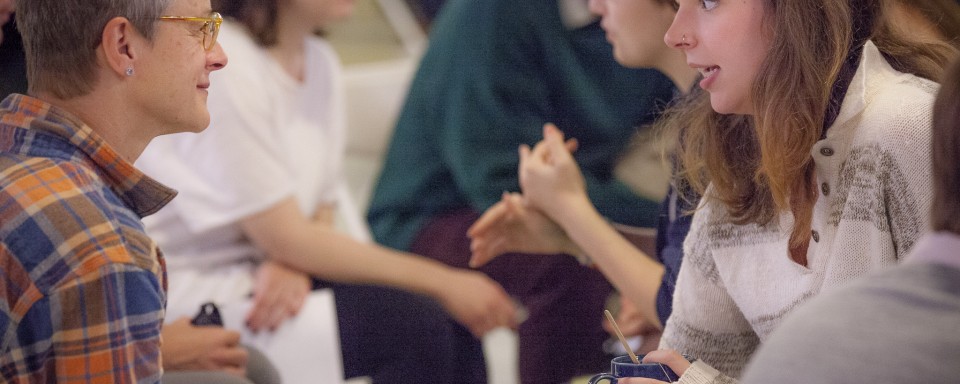by Tanya Steinberg
Students of the Working Class Public History class reflected on their experiences of representing oral histories of Pointe-Saint-Charles which are part of the archive at the Centre for Oral History and Digital Storytelling.
Having very little experience with theatre, I found the speed dating exercise both challenging and enlightening. For an hour, I became Joe Mell, a lifetime resident of the Point, whose childhood memories were so clear and concise that they belied how much time had passed while at the same time emotions attached to the events appeared so recent. Much to my surprise, I was sitting next to Joe Mell – a difficult distraction since she (or he) and I were often telling different stories at the same time. I was simultaneously talking and listening, competing with myself both to tell the correct story and to keep focused. Once, I met up with Joe Mell, himself, and since I spoke first, it caused me reflect afterwards on whether I had honestly represented him or dramatized my telling in any way. There’s a theatrical element to this type of storytelling but that wasn’t the objective. The challenge was how to be authentic to the life of the person whose story you are telling while bringing your own voice into the situation. I ask, when does becoming someone else become performance and how, in this context, do we define an authentic voice?
Perhaps this activity was actually a molding of voices – Joe Mell had his story told and I became the avenue through which it could happen. The longer I told his stories, the more I meandered through different time periods and mood, and this was also stimulated by the stories that Joe was telling next to me. To begin, I stuck with early life events – family structure and his parents’ history, the death of his brother Leo and the creation of Leo’s Boys. But as time went on I began to access other memories, stories of childhood pranks, tragedies, neighbourhood events and stories depicting rich day-to-day community life experience in Pointe St. Charles.
This exercise caused me to reflect on the idea of speed dating itself. It was easier for me to be Joe Mell than it would have been to be on a speed date myself. As Joe Mell, there was no pressure to be liked, accepted or befriended. It was also easy to listen to the “other” with no personal expectation. Our real goal was to be respectful to the life and person we became – and to tell their story, not ours. I had a responsibility to Joe Mell, to be true to what he shared so freely with us through his interview. Would he have been pleased with the way I represented him? Would he have chosen the same stories, or told them in the same way? I asked myself the extent to which one person can truly represent another. In the end, I felt that my task was to be genuine for, and as Joe Mell. I did achieve this but only part of the time. I told the stories and I would say that they were factually accurate. Perhaps next time there may be less of my voice and more of his. What’s important here is that Joe’s voice was brought out of the archive and in that, he continued to tell his story.
by Tanya Steinberg
